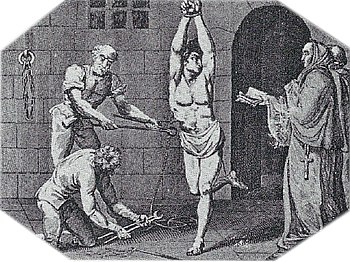The work of cinema’s most notorious nonbeliever, the Spanish lapsed Catholic Luis Bunuel, The Milky Way (1968) is a surrealistic and of course sardonic potpourri picture about 1) Catholic history, and 2) our Christ-haunted Western civilization.
Toward some things Christian Bunuel is in a sympathetic mood, but the mood doesn’t last; before long, he snickers at what he myopically considers ludicrous and trivial. Consider: a papist-hating heretic beholds an apparition of the Virgin Mary, later informing a kindly priest of it, and there is in all this a certain sweetness, no sardonicism. Afterwards, however, a beautiful girl surrealistically pops up in the heretic’s (or ex-heretic’s) room at an inn, which prompts the priest to start lecturing the fellow about the ugliness of sexual impurity and the sacredness of virginity and celibacy—all to Bunuel’s displeasure. He creates biting irony in this whole miracle-followed-by-sexual-morality spectacle, as though nothing of the sort could possibly emanate from a deity.
Most of the film’s surrealism flounders. This being a “history,” Jesus appears in the century in which He lived (as a man) but not for a second do I accept Him as the Jesus of Scripture. He is kind but so lighthearted He lacks most of the dignity I believe the Savior of the world would have. In point of fact, Bunuel doesn’t even allow Him the dignity, after He has healed two blind men, of keeping them healed, for it isn’t long before the blindness mysteriously returns. Our atheistic director could never have accepted that Jesus actually worked those New Testament miracles, but is this a good way to show it?
Or maybe he simply wanted to symbolize the figurative blindness of some of Jesus’ future followers, since Christians in this film often persecute heretics and oppose each other, but is this a good way to show that? To me it isn’t, but even if it were, I wouldn’t want to hear it from a creepy pseudo-thinker like Bunuel.



